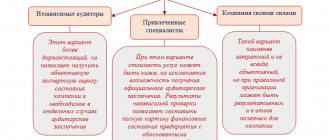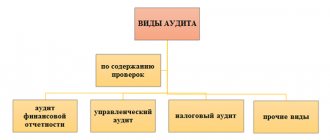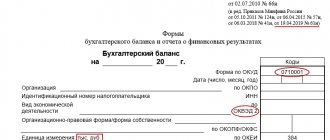Content
- Statutory audit criteria effective in 2022.
- Description of changes to the income threshold at which a mandatory audit is required
- Who needs a mandatory audit in 2022?
- Who will continue to undergo mandatory audits despite the changes?
- Which NPOs can avoid mandatory audits?
- Responsibility for failure to fulfill obligations arising from the audit
- Benefits of receiving an audit
- Why Umbrella Group
A mandatory audit of accounting (financial) statements is an independent verification of the accounting procedure and the preparation of accounting (financial) statements, other aspects of the financial and economic activities of the company and includes: preparation for the audit, its direct conduct, execution and transfer of the conclusion to the customer.
The legislation establishes requirements for experts - an audit report can only be issued by an audit organization that is a member of the SRO (member of the Commonwealth Association (SRO AAS)), which operates in accordance with International Auditing Standards. (Article 3 of Federal Law No. 307-FZ of December 30, 2008 “On Auditing Activities” with subsequent amendments (hereinafter referred to as Law No. 307-FZ)).
Regulatory legal acts establish the rule to conduct an audit of accounting (financial) statements on a mandatory basis. But it does not apply to all organizations, but only to those that meet the specified criteria.
The procedure for conducting a mandatory audit
As in the case of an audit, which is carried out at the initiative of the company, the basis for a mandatory audit is an agreement concluded between the audited organization (customer) and the audit office (performer).
In the text of the agreement, the parties reflect the direction of the audit (audit of financial statements, tax risks, etc.), indicate the program and schedule of control activities, and also fix the obligations for the auditors to provide an opinion in the prescribed form.
A sample agreement can be downloaded here ⇒ Contract for mandatory audit.
Statutory audit criteria in force in 2021.
Article 5 of Law No. 307-FZ lists organizations for which an audit of accounting (financial) statements is strictly mandatory, in particular these include:
- organizations whose securities are admitted to organized trading;
- organizations that are professional participants in the securities market, credit history bureaus;
- organizations that have the organizational and legal form of a fund (with the exception of a state extra-budgetary fund, a specialized organization for managing endowment capital and a fund with the status of an international fund), if in the year preceding the reporting year, property received in excess of 3 million rubles;
- legal entities with income for the year immediately preceding the reporting year is more than 800 million rubles, or, if the amount of assets on the balance sheet as of the end of the year preceding the reporting year is more than 400 million rubles. (except for state authorities, local governments, state and municipal institutions, state and municipal unitary enterprises, agricultural cooperatives, unions of these cooperatives, consumer cooperative organizations).
Features of the audit
In order to carry out a statutory audit, a study of all assets and liabilities, as well as expenses and income, is first carried out. Next, the effect of various factors is studied and an accounting policy is made, the nature of the movement of money is studied and the management's forecast is compared, and then the future development of the business will be considered. According to income levels and the general financial situation, the company can further develop its business. A big role here will be played by indicators of overall turnover, accuracy and clarity of accounting, volumes of inventories, accounts payable and receivable, investments, recorded liabilities and even inventory details.
A mandatory audit begins with preliminary general planning, first there is an acquaintance with the company itself, the scope of work is determined, the cost of services is calculated and then a contract is drawn up. Now the auditors will draw up a clear plan for further actions and determine the nature of the work; now the audit of the company itself begins. This involves an analysis of financial statements and a check to ensure that the company’s work complies with legal standards. According to the results of the audit, a report will be drawn up, that is, an official document to assess the reliability of the company’s work.
It is required that the report made has all the data about the difficulties in the organization's work that have already been discovered through the financial audit. The document will also contain recommendations from specialists that are required to reduce further financial risks. After the audit, the customer will have to receive in his hands the “Audit Summary”, which states the reality of the information provided for the analytical work of specialists, and the customer will also receive an examination of the property status and a document about the quality of work of the company itself.
Modern auditing companies have solid experience in conducting audits for a wide variety of companies in the country, since such a project has too many complexities and its own unique features, which will depend on the scope of the general activity of the company itself. Auditors must be very attentive and conscientious, and in addition to standard audit services, they can also provide consultations that will relate to taxes, management, automation and structuring of the company. To select audit companies for your company, you can view the Expert rating agency, which lists the best audit consulting groups.
Description of changes to the income threshold at which a mandatory audit is required
From 01/01/2021, amendments introduced by Federal Law No. 476-FZ of 12/29/2020 came into force, which established new rules when determining whether a company needs to conduct a mandatory audit of accounting (financial) statements.
The structure of clause 1 of Art. has been completely changed. 5 of Federal Law No. 307-FZ.
One of the main changes is the increase in financial criteria for conducting a mandatory audit of accounting (financial) statements:
- in terms of income - from 400 to 800 million rubles;
- in terms of balance sheet assets - from 60 to 400 million rubles.
According to the new rules, the accounting (financial) statements of organizations that meet at least one of the following conditions are subject to mandatory audit:
- income received from business activities and determined in the manner established by the legislation of the Russian Federation on taxes and fees, for the year preceding the reporting year, exceeded 800 million rubles;
- the amount of assets on the balance sheet as of the end of the year preceding the reporting year exceeded 400 million rubles.
This rule (when the obligation of an audit depends on financial criteria) does not apply to all companies. In particular, it does not apply to state and municipal unitary enterprises, the financial statements of which are subject to mandatory annual audit by an independent auditor in cases determined by the owner of the enterprise's property.
When calculating the changed criteria for conducting a mandatory audit of accounting (financial) statements, it is important to take into account the following nuances.
According to the new rules, what matters is income from business activities; previously, revenue from the sale of products (sale of goods, performance of work, provision of services) was taken into account.
For the purposes of Federal Law No. 307-FZ, the indicator of income received from business activities is determined taking into account the following rules.
- the procedure established by the legislation of the Russian Federation on taxes and fees is used. In particular, according to Ch. 25 of the Tax Code of the Russian Federation distinguishes income from the sale of goods (work, services) and property rights and non-operating income;
- the calculation takes into account income received from all types of activities carried out and applied under all tax regimes;
- income received for the year immediately preceding the reporting year is taken into account.
Audit stages
Whether an audit of a company is carried out for internal purposes to verify the correct functioning of its organizational structures, or is required by the provisions of the Law, it can be divided into three main stages:
- Planning.
- Conducting audit activities.
- Preparation of a conclusion and report on the inspection carried out.
The main task of the first stage is to collect as much information as possible about the company's organizational structure, its internal procedures, business practices and books of accounts, and to prepare an audit plan. All these preliminary steps must be carried out by an external auditor in order to audit the company in the most effective way.
The second stage is audit activity. This is the collection, analysis and creation of documentation on the structure under study through the prism of the requirements of the research being conducted. The auditor examines financial statements as well as other documents such as books of accounts to find and correct irregularities.
The third stage, the most important for the person being audited, is the preparation of a written report on the audit carried out in the company. All its elements are specified in the Audit Law. The main ones include the conclusion that:
- whether the financial statements comply in form and content with the provisions of the Law;
- whether it presents a complete picture of the assets and financial position of the audited company in accordance with applicable accounting rules.
The audit of a limited liability company provides for a mandatory annual audit of the organization, regardless of the following indicators: employment, assets and income. Article 5 of the Law states: “The selection of an audit firm is made by the authority approving the financial statements of the organization, unless otherwise provided by Law, contract or other legal provisions binding the organization.”
Statutory audit in a limited liability company is carried out by an external auditor selected by the meeting of shareholders. The company then enters into a service agreement with the auditor and provides him with access to the books of accounts and all other documents necessary for the activity, as well as providing comprehensive information, explanations and reports. An audit in an LLC may be conducted at the request of a partner who owns at least one-tenth of the organization's authorized capital to examine the company's accounting and operations.
Who needs a mandatory audit in 2022?
Let's consider the characteristics that an organization must meet in order for an audit of accounting (financial) statements to become mandatory for it.
New edition of Part 1 of Art. 5 of Law No. 307-FZ includes a general rule according to which mandatory audits are carried out in cases established by this and other federal laws.
That is, the company’s financial statements are subject to mandatory audit if there is any basis provided for by the legislation of the Russian Federation, even if Law No. 307-FZ does not name such an organization among the persons obliged to conduct an audit.
For example, a small business entity created in the organizational and legal form of a joint-stock company is required to conduct an audit by virtue of Federal Law No. 208-FZ “On Joint-Stock Companies.”
The situation with banks is similar. In the new edition of Art. 5 of Law No. 307-FZ, banks are not listed, but this does not mean that they were exempted from this obligation. According to Art. 42 of Federal Law No. 395-1 “On Banks and Banking Activities”, the annual accounting (financial) statements of a credit organization are subject to mandatory audit.
As for insurance organizations, the norm is that the annual accounting (financial) statements “On the organization of the insurance business in the Russian Federation.”
Mandatory audit for developers is also provided for by a special law (Article 3 of Law No. 214-FZ).
Federal Law No. 476-FZ exempts from the obligation to audit accounting (financial) statements:
- small business entities, with the exception of entities defined by federal laws;
- funds, the receipt of property, including cash, for the year immediately preceding the reporting year does not exceed 3 million rubles;
- consumer cooperation organizations operating in accordance with the Law of the Russian Federation No. 3085-1 “On consumer cooperation (consumer societies, their unions) in the Russian Federation.”
Conclusion: the audit of accounting (financial) statements acquires the status of an obligation if any criterion for its implementation, specified in the legislation of the Russian Federation, is met, or in cases directly specified in Art. 5 of Law No. 307-FZ.
If you find it difficult to determine whether it is necessary to conduct a mandatory audit of accounting (financial) statements, you can contact our experts. We will analyze documents and information about your organization and help you avoid violations of the law and fines.
Submit your application
Fines for failure to conduct a mandatory audit
Organizations that, on the basis of Art. 5 Federal Law-307 imposes obligations to conduct an audit; in case of violation of established requirements, they can be held accountable in the form of a fine.
Penalties applied for failure to conduct a mandatory audit are approved in Art. 15.11 Code of Administrative Offences.
When is the fine calculated?
Fines for failure to conduct a mandatory audit may be assessed on the following grounds:
- The company did not involve auditors to carry out the mandatory audit. Let’s imagine that the activities of a business entity meet the criteria established by Art. 5 FZ-307, but the organization did not involve independent auditors to conduct an audit (the agreement was not concluded, the actual audit was not carried out). In this case, the organization is obliged to pay a fine for failure to conduct a mandatory audit.
- There is no agreement to conduct an audit. When engaging auditors, the company must formalize civil legal relations by concluding an agreement. If there is no written agreement with the audit firm, but the audit actually took place, then the conclusion on the results of the audit is invalid and the audit is considered not carried out.
- No audit report has been issued. The purpose of a statutory audit is to express the auditors’ expert opinion on the reliability of financial statements, the correctness of accounting, the presence of tax risks, etc., which is issued in the form of a conclusion. In the absence of a written audit report, the audit is considered not carried out, and the organization is recognized as violating Art. 5 FZ-307.
- Concealing information about activities in order to avoid mandatory audits. Based on paragraphs. 4 paragraphs 1 art. 5 Federal Law-307, organizations with annual revenue of more than 40 million rubles are subject to mandatory inspection. If an organization deliberately understated financial indicators, and therefore the audit was not carried out due to the lack of grounds, then if a distortion in the reporting is detected, the company is held liable for failure to conduct a mandatory audit.
- An individual auditor conducted an audit of the activities of a securities participant, other credit or insurance organization. In accordance with paragraph 3 of Art. 5 FZ-307, mandatory inspection of an organization whose securities are admitted to trading, as well as insurance companies and credit organizations, is carried out exclusively by audit companies. If such organizations involve individual auditors in the audit, the audit is considered not completed.
- The inspection is carried out less than once a year. Based on clause 5 of Article 5 of Federal Law No. 307, organizations that are charged with an audit obligation under the Law “On Auditing Activities” are required to conduct such an audit once a year. If the audit is carried out less frequently than the established period, the organization is obliged to pay a fine for the periods during which auditor control was not carried out.
Who will continue to undergo mandatory audits despite the changes?
The changes under consideration to Law No. 307 - Federal Law came into force on 01/01/2021.
The application of the new norms in the following situation has been established in a special manner.
The organization, according to the old rules, had to conduct an audit of the accounting (financial) statements for 2022 and (or) earlier periods, but according to the new rules, it did not, and the auditor began executing the agreement to conduct a mandatory audit before 01/01/2021.
Under such circumstances, the norms of Part 1 of Art. 5 of Law N 307-FZ in the new edition do not work. The new rules are applied by the designated organization during the audit of the accounting (financial) statements for 2022.
Accordingly, the new rules do not apply if auditors have already begun working under contracts with those who have been removed from mandatory audit since 2022.
Who may not conduct a mandatory audit from 01/01/2021
Law No. 476-FZ exempts from the obligation to audit financial statements:
- organizations (except for those specified by federal laws), the income received from business activities for the year immediately preceding the reporting year does not exceed 800 million rubles. ;
- organizations (except for those specified by federal laws), the amount of balance sheet assets of which at the end of the year immediately preceding the reporting year ranges from 60 to 400 million rubles. ;
- funds, receipt of property, including cash, which for the year immediately preceding the reporting year does not exceed 3 million rubles. ;
- consumer cooperation organizations operating in accordance with the Law of the Russian Federation “On consumer cooperation (consumer societies, their unions) in the Russian Federation.”
Responsibility for failure to fulfill obligations arising from the audit
The audit report obtained as a result of the mandatory audit of the accounting (financial) statements must be submitted to the Federal Tax Service along with the financial statements, or no later than 10 business days from the date following the date of the audit report, but no later than December 31 of the year in question. for the year for which the financial statements are prepared (Article 18 of Federal Law No. 402-FZ “On Accounting”).
Form for submitting the audit report: electronic. Thus, the audit report on the accounting (financial) statements for 2022 can be sent to the Federal Tax Service until December 31, 2021 inclusive, but it is not advisable to delay the audit.
For organizations subject to mandatory audit, it will be useful not only to conduct an audit and receive an audit report before the end of the calendar year. It is optimal to order an audit of accounting (financial) statements in advance, so that you can have time to adjust the statements based on the results of the audit (in our experience, this is required quite often), and submit updated accounting (financial) statements to the tax authority. The legislation establishes a ban on correcting accounting (financial) statements approved by the owners. Based on this, a mandatory audit is needed before the annual meeting of owners (shareholders) takes place. Let us remind you that for LLCs the deadline for holding a general meeting is until April 30, and for JSCs until June 30.
There is no separate fine for not conducting a mandatory audit.
If a company has an obligation to provide an audit report, but the audit report was not provided, or was provided later than the established deadlines, then the perpetrators will be held administratively liable under Art. 19.7 of the Code of Administrative Offenses of the Russian Federation establishing fines:
- for organizations - from 3,000 to 5,000 rubles;
- for officials - from 300 to 500 rubles.
If an inspection by regulatory authorities reveals that the mandatory audit was not carried out, then a protocol on an administrative offense may be drawn up (Article 15.11 of the Code of Administrative Offenses of the Russian Federation). In this situation, the responsibility of the head of the company will be more noticeable:
- if for the first time they discovered that the audit was not carried out - from 5,000 to 10,000 rubles;
- if repeatedly - from 10,000 to 20,000 rubles. or disqualification from 1 to 2 years.
If an audit report is not provided during preparation for the general meeting to those persons who have the right to do so (clause 3 of Article 52 of Federal Law No. 208-FZ “On Joint-Stock Companies”), liability will arise under Part 2 of Art. 15.23.1 Code of Administrative Offenses of the Russian Federation:
- from 2000 to 4000 rub. for citizens;
- from 20,000 to 30,000 thousand rubles. or 1 year of disqualification - for officials;
- from 500,000 to 700,000 rubles. - for legal entities.
A fine may also be imposed for not posting an audit report on a federal resource - from 5,000 to 10,000 rubles. per official, and for untimely placement - 5,000 rubles. (Article 14.25 of the Code of Administrative Offenses of the Russian Federation), and in case of repeated violation, this fine increases to 50,000 rubles.
What happens if an organization does not conduct a mandatory audit?
Russian legislation does not contain measures of liability for failure to conduct a mandatory audit for organizations whose financial statements are subject to mandatory audit.
But, according to the amendments made to the Federal Law of December 6, 2011 No. 402-FZ and Art. 23 of the Tax Code of the Russian Federation, starting from reporting for 2022, organizations must indicate in their financial statements whether they are subject to mandatory audit. In addition, the audit report is submitted to the tax authority.
For failure to submit annual financial statements to the tax authorities, organizations are liable under clause 1 of Art. 126 of the Tax Code of the Russian Federation. According to this norm, failure to submit documents required for tax control within the prescribed period entails a fine of 200 rubles for each unsubmitted document.
And on the basis of Art. 15.11 of the Code of Administrative Offenses of the Russian Federation, for the absence of an audit report, the tax authority may hold the official responsible for filing it administratively liable. The amount of the fine ranges from 5,000 to 10,000 rubles.
In case of repeated violation, the fine will be from 10,000 to 20,000 rubles or disqualification will follow for a period of one to two years.








